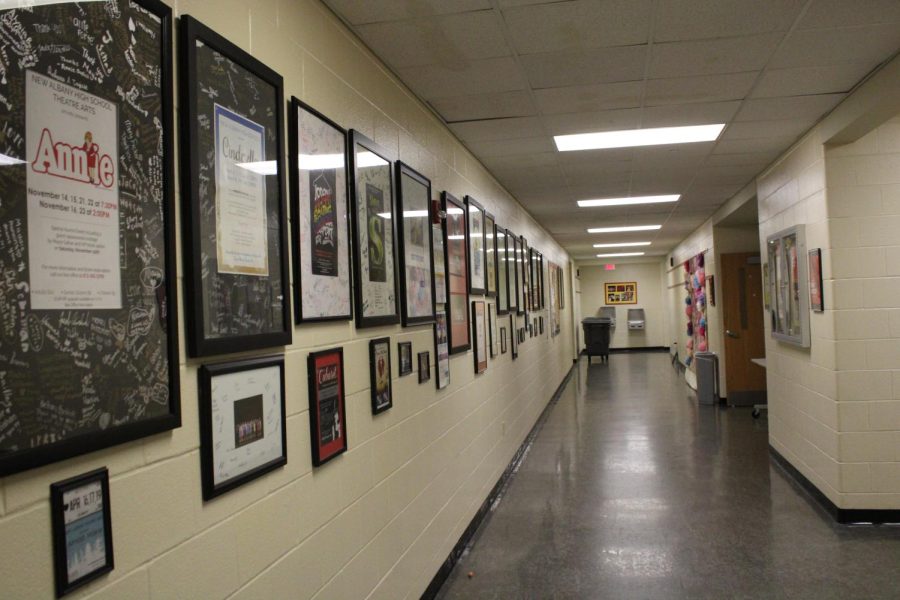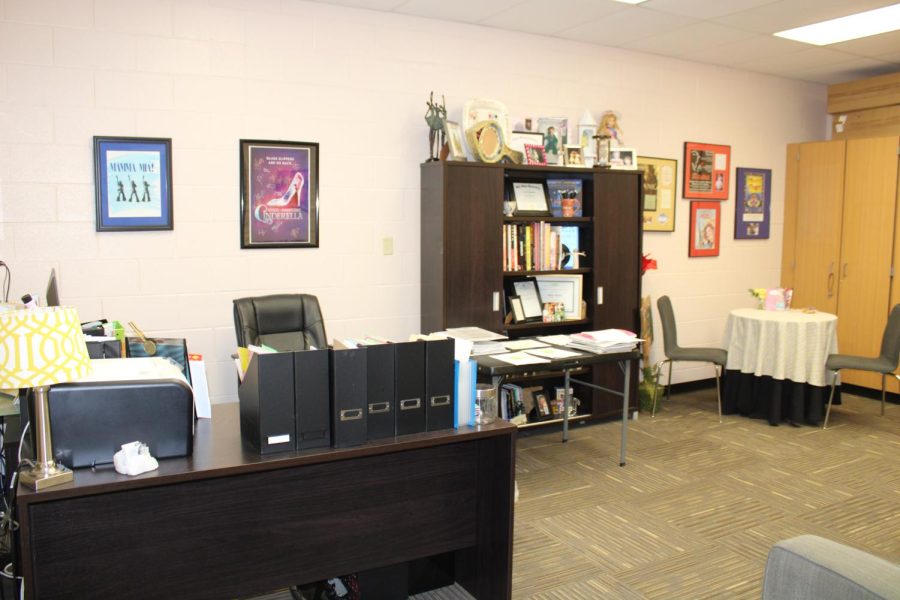Undiscovered NA: Theatre Hallway
May 13, 2022
On the second floor, just beyond the senior commons, students will find the theatre arts classroom- as well as a few additions.
If you’re looking for something spacey, far out, and private- the theatre arts classroom just might be what you’re looking for. Named after its founder, the Tom Weatherston Studio Theatre is a relatively new addition to our school.
Theatre Director Amy Miller says that it’s definitely a continued effort when it comes to upkeep of the classroom.
“In the summer of 2019, we got a couple of upgrades, our curtains, lighting, things like that, the piano in the classroom for any cabarets or musicals, and new chairs for the studio,” Miller said. “There are still things that could definitely be developed in this studio.”
While the theatre room serves as mostly a classroom, it also serves as a performance center, with plans to be used more in the future.
“The goal is to do more of the spring play and cabarets,” Miller said. “We used to do a couple musical cabarets in here but we got sidelined by Covid-19. We got all of this new stuff in right before everything got shut down so Almost, Maine was kind of our first opportunity that we’ve been able to do a full length play in here and get back to using the studio stage.”
Theatre doesn’t receive a large budget from the district, funding is mostly from fundraising and direct ticket sales. That money goes towards the actual theatre and performances; the classroom is a whole other story.
“For a lot of our upgrades we’re always looking at grants because we have to say specifically what we’re using it for,” Miller said. “We can’t allocate the money in any other way but it’s a good way to say we need this equipment, we need this piece, we need this piano, we need a big ticket item that’s harder to fundraise for or find other people in the community or greater state area that can help us.”
Miller estimates they’ve spent several thousand dollars on various classroom upgrades throughout her time at NAHS.
Sometimes though, less is definitely more. When it comes to the overall space, the classroom theatre is a lot smaller and more intimate than the big auditorium.
“One of the positives is that the audience is much closer to the actors, it’s a little more immersive,” Miller said. “We use the stage during class when we do our original plays. It’s much more adaptive and conceptual here, you don’t have to build a huge set in order to have a performance. You can put actors and a few chairs and things up and you have a space.”
Generally, people know that we have a theatre program here at NAHS, but they don’t understand just how big the facilities outside the classroom actually are.
“We maintain the auditorium, that’s the stage, the pit, we have closets and things backstage, we have equipment, we have the shop, we have the actual scene sets,” Miller said. “We have a prop room downstairs that has all of the trees and flowers and my husband named it the jungle room.”
While some programs might have multiple hands on deck, with theatre arts it’s a two man job maintaining the facilities most times.
“Actually maintaining that stuff is difficult because there’s only me and Mr. Upton [Tech Director],” Miller said. “There’s two of us and we have to maintain all parts of the discipline and that includes our equipment. That’s a big part of the job.”
Miller says that as a teacher, “adult person”, it sometimes gets a little difficult being so far from all the other classrooms.
“I have to make myself go out and see people, like lunch duty and walking down to the mailbox every fourth period,” Miller said. “It’s very easy to get isolated as just a teacher, because everybody else, you know all the math teachers are together, you see them, they’re all outside their doors before each class and chatting. We don’t have that, so I have to make myself go out, see other adults, see other people.”
Another positive of the program is how experienced Amy Miller is as a teacher. Performing since she was a toddler, all the way up to working in professional settings – she has plenty of experience and knowledge on the subject.
“With all my experience, I’ve been able to take a little piece of everything,” Miller said. “Instead of just following models I’ve seen or doing what I know is easiest, I’ve been able to take a little piece of everywhere I’ve been. I just think that was a really big asset when I became a teacher that I didn’t just take one course.”
A common misconception is that theatre is just dancing and singing. While that plays a big part in it, there are plenty of other places for you if you aren’t a performer.
“Class is an awesome place to start,” Miller said. “Whether you’re a freshman or a senior, whatever class you end up in, you do a bit of everything in all my classes. If you want to sing, you do musical theatre, our intro classes, our advanced acting, even our intro to tech class, they’re designed so that everyone can experience each of the elements.”
For students without space in their schedule for theatre classes, there are also extracurricular opportunities.
“If you can’t take class, we have tech after school, acting after school, music after school, we’ve got the occasional workshop, Thespian Club, it’s not a small niche,” Miller said. “There are so many different things. We pick up the occasional artist that likes to paint or design or draw or do something specific, those opportunities are there for everyone. You don’t have to be an actor to join class because you’re going to get skills that are going to carry across the disciplines that you’re thinking about.”
Junior Jacqueline Renner has been in the theatre program since her freshman year and serves as an officer in the Thespian Club.
“Theatre is definitely something to try,” Renner said. “It isn’t for everyone but I’ve found that a lot of people who didn’t think they were going to find their way in theatre did and they absolutely love it.”
Even though students have already chosen their classes for next year, there is still time for changes of interest.
“The best way is to email me; I can talk to you about what your options are, and give you an idea of what class is best for you,” Miller said.



